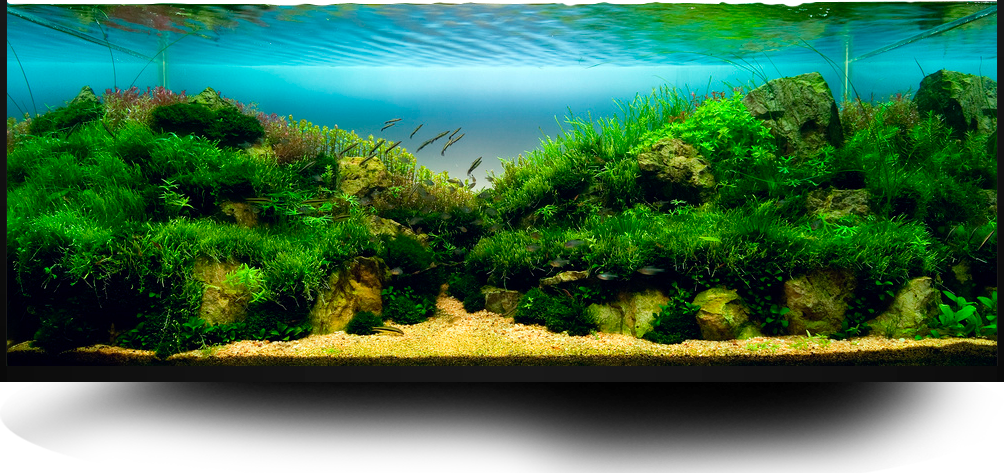
This image has format transparent PNG with resolution 1004x473.
You can download this image in best resolution from this page and use it for design and web design.
Aquarium PNG with transparent background you can download for free, just click on download button.
An aquarium (plural: aquariums or aquaria) is a vivarium of any size having at least one transparent side in which aquatic plants or animals are kept and displayed. Fishkeepers use aquaria to keep fish, invertebrates, amphibians, aquatic reptiles such as turtles, and aquatic plants. The term "aquarium", coined by English naturalist Philip Henry Gosse, combines the Latin root aqua, meaning water, with the suffix -arium, meaning "a place for relating to". The aquarium principle was fully developed in 1850 by the chemist Robert Warington, who explained that plants added to water in a container would give off enough oxygen to support animals, so long as the numbers of animals did not grow too large. The aquarium craze was launched in early Victorian England by Gosse, who created and stocked the first public aquarium at the London Zoo in 1853, and published the first manual, The Aquarium: An Unveiling of the Wonders of the Deep Sea in 1854. An aquarium is a water-filled tank in which fish swim about. Small aquariums are kept in the home by hobbyists. There are larger public aquariums in many cities. This kind of aquarium is a building with fish and other aquatic animals in large tanks. A large aquarium may have otters, turtles, dolphins, and other sea animals. Most aquarium tanks also have plants.
An aquarist owns fish or maintains an aquarium, typically constructed of glass or high-strength acrylic. Cuboid aquaria are also known as fish tanks or simply tanks, while bowl-shaped aquaria are also known as fish bowls. Size can range from a small glass bowl, under a gallon in volume, to immense public aquaria of several thousand gallons. Specialized equipment maintains appropriate water quality and other characteristics suitable for the aquarium's residents.
Most aquaria consist of glass panes bonded together by 100% silicone sealant, with plastic frames attached to the upper and lower edges for decoration. The glass aquarium is standard for sizes up to about 1,000 litres (260 US gal; 220 imp gal). However, glass as a material is brittle and has very little give before fracturing, though generally the sealant fails first. Aquaria are made in a variety of shapes, such as cuboid, hexagonal, angled to fit in a corner (L-shaped), and bow-front (the front side curves outwards). Fish bowls are generally either made of plastic or glass, and are either spherical or some other round configuration in shape.
The very first modern aquarium made of glass was developed in the 19th century by Robert Warrington. During the Victorian age, glass aquariums commonly had slate or steel bottoms, which allowed them to be heated underneath by an open-flame heat source. These aquariums had the glass panels attached with metal frames and sealed with putty. Metal-framed aquariums were still available until the mid-1960s, when the modern, silicone-sealed style replaced them. Acrylic aquariums first became available to the public in the 1970s. Laminated glass is sometimes used, which combines the advantages of both glass and acrylic.
Glass aquaria have been a popular choice for many home and hobbyist aquarists for many years. Once silicone sealant became strong enough to ensure a long-term water-tight seal, it eliminated the need for a structural frame. In addition to lower cost, glass aquaria are more scratch resistant than acrylic. Although the price is one of the main considerations for aquarists when deciding which of these two types of aquaria to purchase, for very large tanks, the price difference tends to disappear.
In this page you can download free PNG images: Aquarium PNG images free download